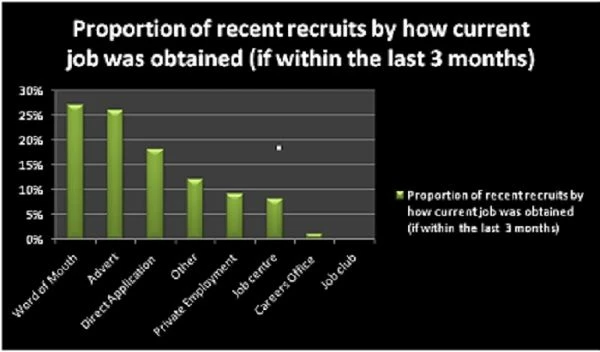
Partner Article
Understanding How Employers Recruit = Successful Job Search?
Ever wondered just how people are finding work? We all know employers use a range of channels when bringing on new recruits but which ones are the most effective and what should we be concentrating our efforts on whilst job searching.
We can loosely split recruitment channels into two categories
1/ Formal: job centres, private employment agencies, advertising across professional journals, job boards and newspapers
2/ Informal methods: personal recommendations from existing employees, direct approaches to potential recruits and word of mouth.
The Labour Force Survey (4 quarters, 2010) looked at how the current job of recent recruits was obtained (if in the last 3 months)
- Word of Mouth 27%
- Advert 26%
- Direct Applicaiton 18%
- Other 12%
- Private Employment 9%
- Job Centre 8%
- Careers Office 1%
- Jobclub 0%
Their findings suggest that informal methods such as word of mouth recommendations, direct applications and direct approaches to recruits were the most likely method of recruitment followed closely by replying to an advert.
Furthermore when employers were asked to rate their overall satisfaction with their chosen recruitment channel they rated “do it yourself recruitment solutions” such as word of mouth and personal recommendations as providing the highest level of satisfaction closely followed by internal notices and candidates who had applied via the company’s website. Whilst an increase in satisfaction could be attributable to the low costs associated with recruiting through this channel, it also suggests that candidate quality may also be higher. Existing employees are only likely to put their personal reputation on the line by recommending good hirers. A study by Barrick (2009) found that job applicants were less likely to quit and had a higher level of performance within 6 months of being hired if they knew a current employee. Similarly those that approach a company directly and have demonstrated that they have carried out a high level of company research have already identified that they are a good company fit and have the necessary skills and attributes.
I think it’s clear that whilst typical job searching tools such as online job boards, trade publications, recruitment agencies, newspapers and job centres still play an important role in the recruitment process job seekers today need to couple these formal methods with informal recruitment routes In order to really conduct an efficient, successful job search.
The importance of a strong personal network is key, and with modern technology so much easier to cultivate, maintain and nurture: we can Link In with people, Poke them on Facebook and follow them on Twitter. If your network know you are actively job hunting and exactly what you are looking for they are more likely to recommend you too their employers and the bigger your network the more companies you will have access too.
With technology at our fingertips our ability to carry out effective company research is so much easier. Allowing us to tailor our applications, locate the most appropriate person to directly approach at any given company and find out directly from them when they are recruiting.
LinkedIn has over 35million members across 140 industries, who have posted information on what they do, where they work now and where they worked in the past as well as a job search engine and the ability to track companies receiving up to date posts direct from them!
Accessing Facebook’s 300million active users and cultivating your network here could lead to you being recommended by a friend to the hiring manger at the company of your dreams!
Tapping into Twitters 140 million users and positioning yourself as an expert could lead to people knocking on your door, offering you a job!
Get out there and network yourself into your next job.
For a free CV review e-mail your current CV to enquiries@ecvconsultancy.co.uk
This was posted in Bdaily's Members' News section by Emma Thornhill .
Enjoy the read? Get Bdaily delivered.
Sign up to receive our daily bulletin, sent to your inbox, for free.








 Raising the bar to boost North East growth
Raising the bar to boost North East growth
 Navigating the messy middle of business growth
Navigating the messy middle of business growth
 We must make it easier to hire young people
We must make it easier to hire young people
 Why community-based care is key to NHS' future
Why community-based care is key to NHS' future
 Culture, confidence and creativity in the North East
Culture, confidence and creativity in the North East
 Putting in the groundwork to boost skills
Putting in the groundwork to boost skills
 £100,000 milestone drives forward STEM work
£100,000 milestone drives forward STEM work
 Restoring confidence for the economic road ahead
Restoring confidence for the economic road ahead
 Ready to scale? Buy-and-build offers opportunity
Ready to scale? Buy-and-build offers opportunity
 When will our regional economy grow?
When will our regional economy grow?
 Creating a thriving North East construction sector
Creating a thriving North East construction sector
 Why investors are still backing the North East
Why investors are still backing the North East